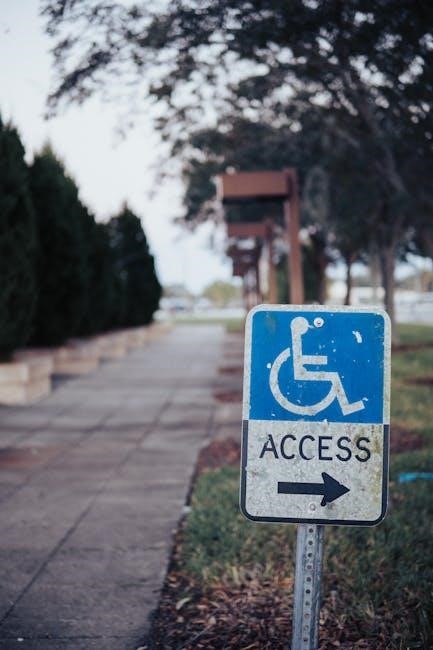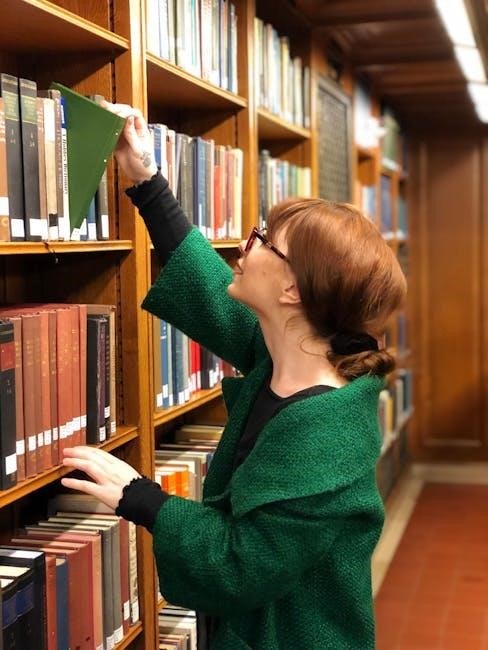
Unlock your potential! This guide provides comprehensive information on the Notary Public Exam in NYC․ Master key topics, legal principles, notarial duties, and ethical standards with our free resource․ Prepare effectively and pass the exam!
NYS Notary Exam Overview
The New York State Notary Public Exam is a crucial step towards becoming a commissioned notary in NYS, NYC, and all counties within the state․ This exam assesses your understanding of notarial laws, procedures, and ethical responsibilities․ Effective preparation is essential for success․ A comprehensive study guide will help navigate the complexities of the exam․
The exam covers various aspects, including document authentication, oath administration, and adherence to legal requirements․ Familiarize yourself with the NYS Notary Public License Law, available online, as it serves as the primary source for exam content․ Understanding the format and content is the first step in creating a study schedule․
Many free resources are available to aid your preparation, including practice questions and flashcards․ These tools will help you assess your knowledge and identify areas needing improvement․ Taking a Notary Exam Preparation Course is also a great way to prepare․ A structured approach, combined with consistent effort, will increase your chances of passing the NYS Notary Exam․
Requirements for Becoming a Notary in NY
To become a Notary Public in New York, several requirements must be met․ Firstly, applicants must be at least 18 years of age and a resident of New York State or have a place of business or employment in New York State․ A thorough understanding of these prerequisites is critical before embarking on your notary journey․
Applicants must also be of good moral character and possess the ability to read and write English․ There are no specific educational requirements beyond this․ However, passing the Notary Public Exam is mandatory․ This underscores the importance of a comprehensive study plan and effective preparation․ The exam assesses your knowledge of New York notary law and procedures․
After passing the exam, you must take the oath of office and pay the required fee to receive your notary commission․ Familiarizing yourself with these steps ensures a smooth transition into your role as a Notary Public․ Meeting all requirements is crucial for obtaining and maintaining your notary license in New York․
Key Topics Covered in the Exam
The NYS Notary Public Exam covers a wide range of essential topics that are vital for performing notarial duties effectively․ One key area is understanding the oath of office, which outlines the responsibilities and obligations of a notary public․ Another crucial topic is the authentication of documents, ensuring their validity and preventing fraud․
Notary ethics forms a significant portion of the exam, emphasizing the importance of integrity and impartiality in all notarial acts․ Candidates must also be knowledgeable about the different types of notarial acts, such as acknowledgments, jurats, and oaths, and the specific procedures for each․

The exam also tests your understanding of the NYS Notary Public License Law, which governs the powers and duties of notaries in the state․ Familiarity with this law is essential for compliance and ethical practice․ Preparing for the exam requires a thorough review of these key topics․
Importance of Legal Principles and Notarial Duties
A solid grasp of legal principles is paramount for Notaries Public, as it forms the foundation for all notarial acts․ Understanding these principles ensures that Notaries perform their duties accurately and ethically, safeguarding against fraud and legal challenges․ Notarial duties, such as administering oaths and taking acknowledgments, require strict adherence to established legal guidelines․
These duties play a crucial role in verifying the identity of individuals and ensuring the authenticity of documents․ Accurate execution of notarial duties protects the integrity of legal processes and provides assurance to all parties involved․ Moreover, a thorough understanding of legal principles enables Notaries to navigate complex situations and make informed decisions․
The NYS Notary Public License Law outlines these principles and duties, emphasizing the responsibility of Notaries to uphold the law and serve the public interest․ Failing to adhere to these legal standards can result in severe consequences, including legal penalties and loss of commission․ Therefore, mastering legal principles and notarial duties is essential for success․
Ethical Standards for Notaries Public
Upholding high ethical standards is crucial for Notaries Public, as they serve as impartial witnesses and protectors of the public trust․ Notaries must act with integrity, honesty, and impartiality in all their duties, avoiding any conflicts of interest that could compromise their objectivity․ Maintaining confidentiality is also paramount, ensuring that sensitive information is protected․
Ethical conduct extends to every aspect of a Notary’s work, from verifying identities to administering oaths․ Notaries must refuse to perform any act they believe to be fraudulent or illegal, and they must always adhere to the NYS Notary Public License Law and its ethical guidelines․ Continuing education and staying informed about changes in the law are essential for maintaining ethical competence․

By adhering to these ethical standards, Notaries Public contribute to the integrity of legal and financial transactions․ A breach of ethics can lead to severe consequences, including disciplinary action, legal penalties, and damage to their reputation․ Therefore, a commitment to ethical conduct is fundamental to the role of a Notary Public․
Utilizing the NYS Notary Public License Law
The NYS Notary Public License Law is the foundational document for all Notaries in New York State․ Thoroughly understanding this law is essential for performing notarial acts correctly and legally․ This law outlines the powers, duties, and responsibilities of Notaries, as well as the procedures for various notarial acts․
Familiarizing yourself with the specific sections of the law is vital․ Pay close attention to the requirements for acknowledgments, oaths, affirmations, and other notarial acts․ The law also covers topics such as fees, record-keeping, and prohibited activities․ Regularly reviewing updates and amendments to the law is crucial to staying compliant․
Utilizing the NYS Notary Public License Law effectively means consulting it whenever you have questions or are unsure about a procedure․ Consider bookmarking key sections for easy reference․ By mastering this law, you will demonstrate competence and professionalism, ensuring that your notarial acts are legally sound and protect the interests of the public․ Accessing the most updated version is crucial․
Effective Study Schedule Creation
Creating an effective study schedule is paramount for success on the NYS Notary Public Exam․ Start by assessing the amount of time you have before the exam and the scope of material you need to cover․ Allocate specific time slots for studying each topic, such as the NYS Notary Public License Law, ethical standards, and types of notarial acts․
Break down large topics into smaller, manageable chunks․ Schedule regular study sessions, but also incorporate breaks to avoid burnout․ Consider using a planner or calendar to track your progress and stay organized․ Be realistic about your commitments and adjust your schedule accordingly․ Remember to prioritize areas where you feel less confident․
Incorporate a variety of study methods into your schedule, such as reading the Notary Public License Law, practicing with sample questions, and reviewing flashcards․ Regularly assess your understanding of the material and adjust your schedule as needed․ By creating and sticking to an effective study schedule, you will maximize your chances of success on the NYS Notary Public Exam․ Consistency is key for effective learning․
Analyzing Performance on Practice Tests

Analyzing your performance on practice tests is crucial for identifying strengths and weaknesses in your understanding of the NYS Notary Public Exam material․ After completing each practice test, carefully review your answers, paying close attention to the questions you answered incorrectly․ Identify the specific topics or concepts that caused you difficulty․
Don’t just focus on the correct answers; understand why the incorrect answers were wrong․ This will help you avoid making the same mistakes on the actual exam․ Track your progress over time to see if you are improving in specific areas․ Use your practice test results to guide your studying, focusing on the topics where you need the most improvement․
Consider creating a chart or spreadsheet to track your scores on each practice test, along with the topics covered․ This will help you visualize your progress and identify trends․ Analyze the types of questions you consistently get wrong, such as those related to legal principles or notarial duties․ By thoroughly analyzing your performance on practice tests, you can tailor your studying to address your specific weaknesses and maximize your chances of success on the NYS Notary Public Exam․
Types of Notarial Acts
Understanding the different types of notarial acts is fundamental to performing your duties as a Notary Public in New York․ The primary notarial acts include acknowledgements, where a signer confirms their signature on a document; affirmations and jurats, involving sworn statements; copy certifications, verifying that a copy is a true and accurate representation of an original document; and witnessing or oaths, where a notary witnesses a signature or administers an oath․
Each notarial act has specific requirements and procedures that must be followed meticulously to ensure the validity of the document․ For acknowledgements, the signer must personally appear before the notary and acknowledge that they signed the document willingly․ Affirmations and jurats require the signer to swear or affirm the truthfulness of the document’s contents․ Copy certifications demand a careful comparison of the copy to the original․
When administering oaths, the notary must ensure the person understands the significance of the oath and is willing to be bound by it․ Familiarize yourself with the specific wording required for each type of notarial act, as outlined in the NYS Notary Public License Law․ Mastering these different types of notarial acts is essential for providing accurate and reliable notarial services․
